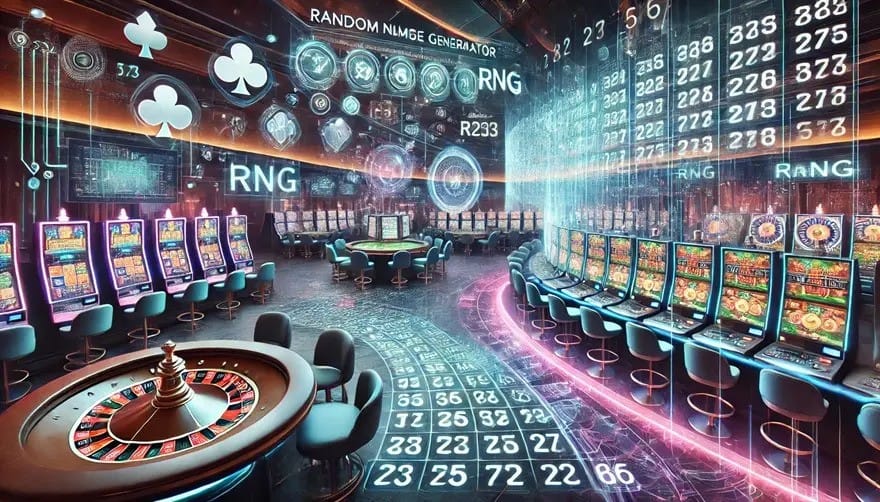What Is RNG: Can Technology Guarantee Complete Unbiased Randomness?
With AI in our hands, it is easier than ever before to analyze large piles of data.

We all love playing slots, but most slot players have experienced a strange action that leads them to think that the software they use somehow feels rigged. But don’t slots use random number generators, which are advertised as truly unpredictable?
Well, to a certain degree, yes, but there is always an option for an RNG to be rigged or for people to find the pattern and already know the upcoming hands.
The world of random number generators is changing how we play casino games, and I think we are on a bridge where we might see a huge advancement in the technology that determines the unpredictability of such games, or the entire system will fall apart.
Nowadays, with AI in our hands, it is easier than ever before to analyze large piles of data. Therefore, these RNGs need to become more advanced just so we can ensure fair gameplay for all.
But what’s the current state of Random Number Generators? Is there something you must know before you choose your next game?
What Exactly Is RNG?
Casino games are designed to have a random outcome, which is where RNG comes in handy. Their job is to generate a “random” sequence of numbers or symbols (usually numbers) that cannot be predicted. It is basically like a stopwatch running through thousands of different combinations (numbers that symbolize the symbols on the reels) all the time and whenever you hit the “Spin” button, you basically stop on the random combination that you get.
But not all Random Number Generators are the same, which is where things get complicated.
There are True Random Number Generators (TRNGs) and Pseudo-Random Number Generators (PRNGs). I know things turned complicated literally, but bear with me, this is much simpler than you think.
So, which is better at creating a randomized outcome?
True Random Number Generators (TRNGs)
TRNGs rely on unpredictable physical processes—like radioactive decay or atmospheric noise—to generate randomness.
Imagine trying to predict the exact moment an atom will decay; it's practically impossible, and that’s the beauty of TRNGs. These RNGs are used in situations where security is crucial, such as encryption and cryptographic key generation.
Pseudo-Random Number Generators (PRNGs)
On the other hand, PRNGs use algorithms and initial seed values to generate a sequence that appears random. However, because they are algorithm-based, if you know the seed and the algorithm, you can predict the sequence.
PRNGs are faster and more efficient than TRNGs, making them the go-to for many applications, from video games to simulations. But the trade-off? They aren’t truly random.
Both of them have good and bad things, which is why you have to check other things apart from the RNG when choosing a casino. Click here to check out the latest online casino offers.
Can RNGs Truly Be Unbiased?
Now that we understand what RNGs are, the big question is whether they can provide complete unbiased randomness. The short answer is—sort of.
The Quantum Solution
For those who demand the highest level of randomness, quantum RNGs (QRNGs) offer a fascinating solution.
These use quantum processes, like the behavior of photons, which are inherently unpredictable. The randomness generated by a QRNG is considered the gold standard because it’s not just random; it’s fundamentally unpredictable even if you have all the information in the universe.
The Pseudo-Random Dilemma
Here's where things get a little tricky. Because pseudo-RNGs are based on algorithms, there's always a theoretical possibility that they can be biased or predictable—especially if the seed isn't truly random. For example, if a game uses a predictable seed, someone could potentially figure out the pattern and exploit it.
RNGs in Gaming and Fairness
In the world of online gaming, RNGs are critical for fairness. For example, in online casinos, PRNGs determine the outcome of virtual dice rolls, card shuffles, and slot machine spins. To ensure that these games are truly fair, reputable casinos regularly audit their RNGs with third-party organizations like eCOGRA or iTech Labs.
These audits test for statistical randomness to ensure that no patterns or biases exist, providing players with a fair gaming experience.
Can We Achieve Unbiased Randomness?
True RNG, on the other hand, draws from the unpredictability of the physical world. Because it’s not based on a predictable algorithm, it’s much harder (if not impossible) to bias or predict. However, true RNGs are slower and more resource-intensive, which is why they aren't used as frequently as pseudo-RNGs.
FAQs: Common Questions About RNG
Q: Can RNGs be hacked?
A: While it's challenging, it's not impossible—especially with poorly implemented or weak RNGs. That’s why strong cryptography practices are crucial.
Q: Are all RNGs the same?
A: Not at all! TRNGs and PRNGs serve different purposes, and their effectiveness depends on the application. PRNGs are generally faster and more efficient, while TRNGs offer true randomness.
Q: How do I know if an RNG is unbiased?
A: Testing and certification processes, like those conducted by gaming commissions, can help ensure that RNGs are fair and unbiased. However, no system is entirely foolproof.






